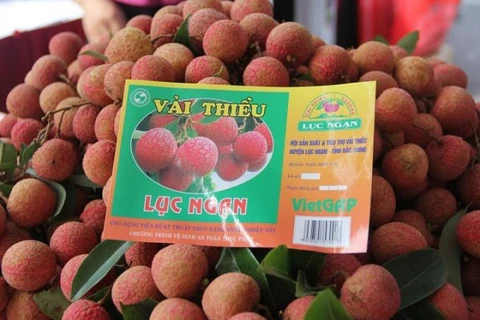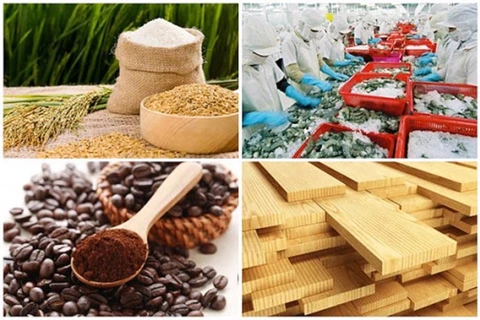Hanoi (VNA) – After many market fluctuations in the first quarter of 2023, Vietnam’s exports of vegetables and fruits saw positive moves in the second quarter.
According to statistics of the General Department of Vietnam Customs, Vietnam's fruit and vegetable export turnover reached more than 1 billion USD in June 2023, raising the figure in the first half of this year to 2.75 billion USD, more than 63% higher than that of the same period last year.
Dang Phuc Nguyen, General Secretary of the Vietnam Fruit and Vegetables Association (Vinafruit), said that the export revenue in June set a record so far thanks to China’s opening to many Vietnamese fruits such as durian and grapefruit.
China led the top five importers of Vietnam's vegetables and fruits with exports to the country accounting for more than 63% of Vietnam's total export value.
Vietnam’s vegetable and fruit exports to the US decreased by 12% over the same period in 2022 but other major importers - the Republic of Korea, Japan, and the Netherlands - saw increases of 12%, 0.5%, and 70%, respectively.
If the upward trend continues until the end of 2023, Vietnam can hit the export goal of 5 billion USD set by the Ministry of Agriculture and Rural Development for 2025, Nguyen said.
 The official export channel to the Chinese market is an opportunity for Vietnam to develop the vegetable and fruit sector in the direction of modernity, sustainability, and close links from production to consumption. (Photo: VNA)
The official export channel to the Chinese market is an opportunity for Vietnam to develop the vegetable and fruit sector in the direction of modernity, sustainability, and close links from production to consumption. (Photo: VNA) A representative of the Agency of Foreign Trade under the Ministry of Industry and Trade said that China is currently implementing a policy of mainstreaming commercial activities, so Vietnam needs to pay more attention to exporting via official channels.
Vietnam has also built material areas, and granted planting area codes following the requirements of the Chinese market to make Vietnamese products eligible to enter the Chinese market.
Late last year, Vietnamese green-skinned grapefruit received a planting area code for export to China. Recently, sweet potatoes and durian were also granted the codes, which creates more motivation for Vietnam’s vegetable and fruit sector to invest in production and export.
Nguyen said that the official export channel to the Chinese market is an opportunity for Vietnam to develop the vegetable and fruit sector in the direction of modernity, sustainability, and close links from production to consumption as well as increase the values and position of Vietnamese fruits and vegetables in the international market.
Ngo Tuong Vy, General Director of Chanh Thu Fruit Export Group Joint Stock Company, said that the company will export 20,000-30,000 tonnes of durian to China in 2023. However, to compete with other exporters from Thailand and the Philippines, Vietnamese businesses and farmers must focus on increasing quality.
Currently, Vietnamese durian has many competitive advantages compared to Thai and Philippine durian. Vietnam's durian output is now increasing to around 1 million tonnes, and harvesting time is almost year-round while Thailand and the Philippines only harvest seasonally. In addition, the shorter shipping distance from Vietnam to China is also an advantage to help Vietnamese durian stay fresh, and the shipping costs included in the price will be cheaper than those of the competitors.
Phuc from the Vietnam Fruit and Vegetables Association said that the Ministry of Agriculture and Rural Development should continue to negotiate and sign more protocols for products to be exported via official channels such as dragon fruit, mango, watermelon, jackfruit, and rambutan.
The Chinese market is expected to be opened for items such as green-skinned pomelo, fresh coconut, avocado, lemon, pineapple, and star apple. In addition, it is necessary to open up other markets such as the RoK, Japan, Australia, and the US./.
























